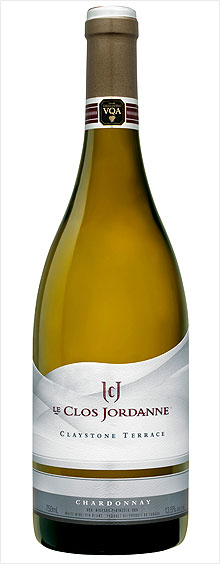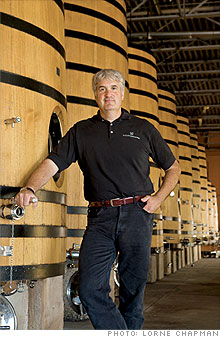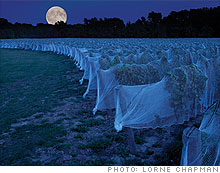World's best Chardonnay...from Canada?
A blind tasting rocks the wine world, placing a small Canadian winery in league with French and Californian powerhouses.
 |
| Le Clos Jordanne's 2005 Claystone Terrace rocked the wine world in what is being dubbed, "The Judgment of Montreal." |
 |
| Thomas Bachelder, winemaker at Clos Jordanne |
 |
| The Clos Jordanne vineyard at night |
TORONTO (Fortune) -- Ask most wine hounds and sommeliers on either side of the Atlantic where the best chardonnay originates, and the answer will almost certainly be California or France.
But that may soon change, thanks to a blind tasting billed as the Judgment of Montreal. Bragging rights for making the world's best chardonnay now belong to Le Clos Jordanne, a small winery in the Niagara region of Canada, whose 2005 Claystone Terrace -- at $33.75 per bottle -- recently upset pedigree rivals from Napa and Burgundy previously considered unbeatable.
The result may redraw the global wine map, just as the Judgment of Paris did 33 years earlier. At that storied showdown between France and the United States, the host country's top palettes awarded the blue ribbon in a blind test of two categories -- cabernet sauvignon and chardonnay -- to Californian upstarts.
It was a verdict heard around the world, debunking the myth that Old World wines were superior to their New World counterparts. French wine snobs and winemakers went ballistic, accusing the judges of betraying their country and criticizing the outcome as statistically meaningless. But their case of sour grapes didn't stop the California wine industry: The victory in Paris helped galvanize the loose alliance of wineries into a global powerhouse on par with France, Italy, and Spain.
Will the Judgment of Montreal have similar consequences for Canada -- a country better known for hockey, maple syrup, and oil from the Alberta tar sands? The Niagara Peninsula doesn't have the scale to steamroll its competition -- it's about one-tenth the size of Napa -- but there is plenty of room for growth. And its recent high-profile success offers a rare opportunity to build brand recognition at home and abroad.
"I think we won in Montreal because of our unique terroir," says Thomas Bachelder, winemaker at Clos Jordanne, referring to the clay- and limestone-rich soil of the Niagara Peninsula that gives the winery's chardonnays their tricky mid-Atlantic character. "It didn't offend any of the judges."
The Judgment of Montreal was organized by the Société des alcools du Québec, a provincially-owned alcohol retailer with more than $2 billion in annual sales. It invited Quebec's top wine writers and sommeliers, who tend to favor Old World wines, to revisit the historic Judgment of Paris.
But there was one important difference: In addition to the French and American contenders, pirate wines -- from Canada, Australia, and New Zealand, in the case of the chardonnay category -- were also snuck into the blind tasting.
The resulting Canadian victory -- and less surprisingly, Australia's third-place finish (Rosemount Estate Roxburgh, $39.80) -- was another New World upset. For the clubby wine world, the decision was tantamount to Belgium defeating the United States in baseball. (In the cabernet sauvignon category, the top three spots all went to Bordeaux, France.)
"This means Canadian wines have to be taken seriously," says Steven Spurrier, organizer of the Judgment of Paris in 1976, from his home in London. Spurrier, who is 68, has revisited his original tasting several times over the years in New York, Napa, and London -- notably on the judgment's 10th and 30th anniversaries.
The results have been much the same as the first installment, which Spurrier organized on a whim when he owned a wine shop in Paris as a young man. (He had no idea it would make history, but a Time magazine correspondent -- the only reporter who bothered to attend the tasting at Paris's Inter-Continental Hotel -- insured that it did.)
Spurrier is familiar with the Niagara Peninsula, and describes the Claystone Terrace chardonnay as "a very European version of a Canadian wine." That may be mixed praise from the elder statesman of wine, but winemaker Bachelder isn't likely to take offense. The Canadian trained in Burgundy for years and retains close ties to what is arguably France's top wine region.
But it's Canada he's celebrating now: "Sometimes we're slow to react to our own success in Canada," says Bachelder, a bearish viticulturist with a 6-foot-5 frame. "I hope that doesn't happen this time."
Clos Jordanne, which has 75 acres under cultivation, is owned by Constellation Brands Inc. (STZ) of Victor, N.Y., the world's largest wine company with operations in more than 150 countries and annual revenue of $3.8 billion. (It acquired the Niagara winery in its takeover of Vincor Canada in 2006.)
"I wish Constellation would focus on wines of Clos Jordanne's quality," says Larry Paterson of the Ontario Viniculture Association, which represents 60 percent of the province's wineries, referring to the wine giant's tendency to focus on mass-market brands.
That could take a while -- if it happens at all -- but in the meantime, Clos Jordanne's U.S. parent may have a more pressing task: Capitalizing on its newfound Canadian star power. ![]()
-
 The retail giant tops the Fortune 500 for the second year in a row. Who else made the list? More
The retail giant tops the Fortune 500 for the second year in a row. Who else made the list? More -
 This group of companies is all about social networking to connect with their customers. More
This group of companies is all about social networking to connect with their customers. More -
 The fight over the cholesterol medication is keeping a generic version from hitting the market. More
The fight over the cholesterol medication is keeping a generic version from hitting the market. More -
 Bin Laden may be dead, but the terrorist group he led doesn't need his money. More
Bin Laden may be dead, but the terrorist group he led doesn't need his money. More -
 U.S. real estate might be a mess, but in other parts of the world, home prices are jumping. More
U.S. real estate might be a mess, but in other parts of the world, home prices are jumping. More -
 Libya's output is a fraction of global production, but it's crucial to the nation's economy. More
Libya's output is a fraction of global production, but it's crucial to the nation's economy. More -
 Once rates start to rise, things could get ugly fast for our neighbors to the north. More
Once rates start to rise, things could get ugly fast for our neighbors to the north. More







